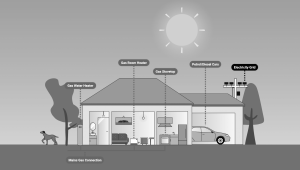Saul Griffith is an engineer and entrepreneur specialising in clean and renewable energy technologies and the author of 3 books including Electrify and The Big Switch. He is the founder of Rewiring Australia, a non-profit organisation dedicated to electrification, decarbonisation and the associated policy towards meeting climate goals.
‘Australia has the opportunity to lead the world. We are the first nation where, using all electric zero emission appliances and vehicles will save every home money. We have access to the cheapest delivered electricity in the world – our rooftop solar – and this abundant energy can electrify our industries and generate an abundant future.
The best way to run your home – for your wallet and for the climate – is to have all-electric appliances and cars powered by clean electricity. It’s half the running costs of a fossil fuel home and it’s how we’ll have the biggest impact on climate this decade.
The majority of Australia’s greenhouse gas emissions come from energy use – machines that burn fossil fuels. 60% of Australia’s emissions are domestic emissions, the direct result of our daily lives. They are our direct responsibility and under our control.
The largest portion of domestic emissions is from our households (42%). Almost all of these emissions come from the machines in our daily lives. Petrol cars, gas heaters, gas water heaters, gas stoves, and the fossil fuel power plants supplying most of Australia’s grid network electricity.
Replace Them
The solution to these emissions is switching our fossil fuel machines to efficient electric versions and powering them with clean electricity, including lots of rooftop solar. As your fossil fuel-powered machines age, you can gradually replace them with electric machines.
In Australia we have access to the cheapest home energy in the world – our rooftop solar. Over its lifetime, rooftop solar costs about 3 cents per kWh, cheaper than any other source of home energy. Combined with a home or community battery, it’s still cheaper than the grid. The cost of sending that energy over powerlines alone is more than the cost of the energy that comes from your roof. The best option is to power as much of your home off your own solar system as you can. Using rooftop and no energy emissions.
Less Oil Imported
The story gets even better into the future. For the last 30 years fossil fuel prices have risen roughly alongside the consumer price index. Following this trend into the future shows the savings continue to grow for electrified homes.
Simultaneously, the prices of solar, batteries, and electric vehicles continue to drop with manufacturing cost curves, or ‘economies of scale’.
At a community level, this means less oil imported from overseas, thousands of jobs in installation and maintenance for the next decade, and millions in energy savings for homes, a lot of which will be spent in the local economy, improving the community even more.
It’s a story of community economic abundance, and a once in a lifetime opportunity for Australia.’
Many thanks to Saul Griffith and Rewiring Australia for this edited version of his PowerPoint. For more information, please go to https://www.rewiringaustralia.org/
(this article first appeared in Inklings Summer Edition.)
Local group Energy Forever along with Rotary Enviro, Climate Change Australia and Electrify Australia will run a forum / Q& A, ‘ELECTRIFY 244X’, plus an electric vehicle showcase on Saturday 17th February at the St Columba Anglican School in Port Macquarie.
Keynote speakers: Giles Parkinson from Renew Economy, Dr Ken Henry, Chairperson of Accounting for Nature, Jarra Hicks from Community Power Agency, and Ian Askell from Essential Energy.
The forum and Q& A will focus on electrifying the local areas (with postcodes beginning with 244-) by discussing these topics:
· Saving money and the environment with household and community solar and batteries.
· EVs and charging.
· Heat pumps for heating, cooling and hot water.
· Carbon accounting benefits for local government and communities.

